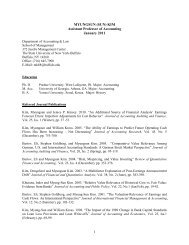Organizational Behavior (The Human Side of Management Sequence)
Organizational Behavior (The Human Side of Management Sequence)
Organizational Behavior (The Human Side of Management Sequence)
Create successful ePaper yourself
Turn your PDF publications into a flip-book with our unique Google optimized e-Paper software.
1<br />
STATE UNIVERSITY OF NEW YORK AT BUFFALO<br />
SCHOOL OF MANAGEMENT<br />
P-MGB 601 - Night Session<br />
Intro to <strong>Organizational</strong> <strong>Behavior</strong><br />
Fall 2013<br />
Pr<strong>of</strong>essor Fred Dansereau<br />
276 Jacobs <strong>Management</strong> Center<br />
Office Hrs.: Wed. 9:10 - 10:10 PM<br />
Thurs. 9:10 - 10:10 PM<br />
and by appointment<br />
Phone: 645-3236 (O), 838-4641 (H)<br />
E-mail: mgtdanso@buffalo.edu<br />
Fax: 645-2863 – please advise me <strong>of</strong> fax<br />
transmissions.<br />
Send e-mails with attachments to my<br />
secretary at: tubisz@buffalo.edu.<br />
Please notify me <strong>of</strong> email to her.<br />
<strong>Organizational</strong> <strong>Behavior</strong><br />
(<strong>The</strong> <strong>Human</strong> <strong>Side</strong> <strong>of</strong> <strong>Management</strong> <strong>Sequence</strong>)<br />
Course Description<br />
This is a graduate level course about human behavior in organizations and focuses on the person, dyad,<br />
group, and collective levels <strong>of</strong> analysis as ways to understand and manage organizational behavior. This<br />
is accomplished by focusing heavily on the meaning and use <strong>of</strong> 34 key concepts that can serve as<br />
management tools.<br />
Required Text and Materials<br />
Textbook<br />
Greenberg J. (2011). <strong>Behavior</strong> in organizations.(Tenth Edition) Upper Saddle River, NJ: Pearson<br />
Education/Prentice Hall. This book provides background material and descriptions, in writing, <strong>of</strong><br />
the key concepts and is referred to as G. in this course outline<br />
Plus 2 packages<br />
(1) Key Concepts. This package describes the key concepts in outline (lecture) form and explains<br />
how to use the concepts. You will need this package in each class since it contains all the power<br />
point slides used in class by me.<br />
(2) Course Guide: This package includes examples <strong>of</strong> deliverables and instructions about how to<br />
study for quizzes and complete papers for this course.
2<br />
Grading<br />
<strong>The</strong> 5 deliverables for the course are:<br />
1. One in class presentation and one Individual Paper about the application <strong>of</strong> one key concept to<br />
the real world (10 points for the written paper. No points for the presentation).<br />
<strong>The</strong> due date <strong>of</strong> the in-class presentation depends on the date <strong>of</strong> presentation listed in the<br />
course outline. <strong>The</strong> written paper is due two weeks after the presentation.<br />
2. Quiz #1 (25 points): Covers Key Concepts 1 to 16. In-class on October 16<br />
3. Team Project: Paper and Presentation (25 points):<br />
Presentation (5 points) due in class Dec. 4.<br />
Team Final paper (13 points) covering 28 concepts due by Dec. 11<br />
Individual paper (7 points) about the team due by Dec. 11<br />
(extension <strong>of</strong> deadline to Dec. 16 allowed if requested)<br />
4. Quiz #2 (25 points) Covers Key Concepts 17 to 34 In-class Dec. 13<br />
5, End <strong>of</strong> Class Reviews (15 points): At the end <strong>of</strong> many classes at my discretion.<br />
Grades will be curved if necessary. Brief descriptions <strong>of</strong> the: Individual Presentations, Quizzes,<br />
Team Projects, and End <strong>of</strong> Class Reviews appear in this material after the course outline. In addition, the<br />
Course Guide package contains various instructions and examples to guide you in how to do well in an<br />
individual presentation and paper, the two quizzes, and preparing and completing the team project. Each<br />
deliverable in the course is designed to help develop a set <strong>of</strong> managerial skills. All students who earn at<br />
least 93 total points or more will receive a grade <strong>of</strong> A.<br />
Active Learning<br />
This course uses active learning which studies show results in better short and long term learning. Active<br />
learning means that students are actively involved in the class. Examples include the student<br />
presentations, the two quizzes that require you to construct a case and answers rather than memorize<br />
concepts, the team project based on a topic <strong>of</strong> interest to you, and end <strong>of</strong> class reviews that allow me to<br />
tailor future classes to the issues that you raise.<br />
Thus, there will be various in-class exercises and projects in which you will have to interact with<br />
other students. If you have problems in dealing with people who differ from you in terms <strong>of</strong> age, religion,<br />
creed, color, disability, national origin, race, ethnicity, sex, marital status, veteran status, or sexual<br />
orientation, it is expected you will not bring your problems to class. New York State law prohibits<br />
discrimination based on any <strong>of</strong> these categories.
3<br />
Reading List and Course Outline<br />
<strong>The</strong>re are the following three resources available for each <strong>of</strong> the 34 key concepts: (1) <strong>The</strong> pages in the textbook<br />
that cover each concept are listed in the next section. <strong>The</strong> entire chapters listed from the textbook provide contexts<br />
for the concepts, (2) the key concept package provides application material and descriptions for all concepts, and<br />
(3) the course guide provides example <strong>of</strong> an application all concepts for my job and a completed team project that<br />
uses all the concepts.<br />
___________________________________________________________________________________<br />
Section 1. Introduction and Overview<br />
___________________________________________________________________________________<br />
Aug. 28, Sept. 11<br />
Topic: Introduction<br />
Readings: Greenberg, Chapters 1 and 2<br />
In class I will present:<br />
Key Concept 1 (Service to Society, G, pp. 7-9, Fig. 1.3)<br />
Key Concept 2 (Levels <strong>of</strong> Analysis, G, pp. 4-5, Fig. 1.1)<br />
___________________________________________________________________________________<br />
Section 2. <strong>The</strong> Person View <strong>of</strong> Organizations<br />
___________________________________________________________________________________<br />
Sept. 18<br />
Topics: Perception, Attribution, and Decision Making<br />
Reading: Greenberg, Chapter 3 (pp. 72 to 90) and Chapter 10 (pp. 333- 360)<br />
In class on Sept. 18, I will present<br />
Key Concept 3 (Self Fulfilling Prophecy, G, pp. 81-86)<br />
Key Concept 4 (Satisficing, G., pp. 349-350)<br />
Key Concept 5 (Attribution, G., pp. 76-78)<br />
Key Concept 6 (Decision Making, G., pp. Fig. 10.1 pp. 334-337)<br />
Reminder: you can hand in your hard copy <strong>of</strong> your attempt to answer the quiz<br />
for self-fulfilling prophesy, using only one level any time after Sept. 18<br />
but not before Sept. 19. You can email my secretary after the 18th<br />
Sept. 25 – Oct. 2<br />
Topic: Motivation<br />
Reading: Greenberg, Chapter 7 and Chapter 3 (pp. 90–110)<br />
In class on Sept. 25, students will present (with their case applications):<br />
Key Concept 7 (Maslow, G., pp. 232 Table 7.4 See Key Concepts package)<br />
Key Concept 8 (Reinforcement, G., pp. 90-110)<br />
In class on Oct. 2, students will present (with their case applications):<br />
Key Concept 9 (Expectancy, G., pp. 230-236)<br />
Key Concept 10 (Equity, G., pp. 224-230)
4<br />
Oct. 9<br />
Topics: Personality and Individual Differences<br />
Readings: Greenberg, Chapter 4 and Appendix 2<br />
In class on Oct. 9, students will present (with their case application[s]):<br />
Key Concept 11 (Locus <strong>of</strong> Control, G., pp. 122-123)<br />
Key Concept 12 (Need for Achievement, G., pp. 125-128)<br />
Key Concept 13 (Briggs Meyer, See Key Concepts package)<br />
Key Concept 14 (Type A & B, See Key Concepts Package)<br />
Key Concept 15 (Career Progression, G., pp. 607-612)<br />
Key Concept 16 (Defense Mechanisms See Key Concepts package)<br />
Oct. 16<br />
Quiz #1 in class<br />
___________________________________________________________________________________<br />
Section 3. <strong>The</strong> Dyad and Group View <strong>of</strong> Organizations<br />
<strong>The</strong> material for the final quiz (which is not comprehensive) begins with Concept 17 below. Concept 17<br />
is actually a Person Level Concept<br />
______________________________________________________________________________<br />
Oct. 23<br />
Oct. 30 – Nov. 6<br />
Nov. 13<br />
Topics: Stress, Groups, and Communication<br />
Reading: Greenberg, Chapters 5, 8, 9 and 10 (pages 361-363)<br />
In class on Oct. 23, students will present (with their case applications):<br />
Key Concept 17 (Stress, G., pp. 155-161)<br />
Key Concept 18 (Group Processes, G., pp. 255-256 & 259-262)<br />
Key Concept 19 (Group Decision Making, G., pp. 361-363)<br />
Key Concept 20 (Communication, G., pp. 293-294 & 319-326)<br />
Topic: Leadership<br />
Readings: Greenberg, Chapter 13 ,<br />
Plus article titled: Individualized Leadership by Yammarino &<br />
Dansereau in the Journal <strong>of</strong> Leadership and <strong>Organizational</strong> Studies, 9, 1<br />
pp. 90-99 (available in the Course Guide package)<br />
In class on Oct. 30, students will present with their case applications:<br />
Key Concept 21 (Managerial Grid & Ohio State, G., pp. 457-459)<br />
Key Concept 22 (Vroom & Yetton, G., pp. 455-457)<br />
In class on Nov. 6, students will present (with their case applications):<br />
Key Concept 23 (Leader Member Exchange, G., pp. 459-460),<br />
Key Concept 24 (Individualized Leadership, See 2 packages) ),<br />
Key Concept 25 (Charismatic Leadership, G., pp. 451-454)<br />
Topics: Power, Conflict and Intergroup processes<br />
Readings: Greenberg, Chapter 11& 12<br />
In class on Nov. 13, students will present (with their case applications):<br />
Key Concept 26 (Power, G., pp. 418-423)<br />
Key Concept 27 (Intergroup Process See mainly Key Concepts package<br />
also see pp. 391-396)
_________________________________________________________________________________<br />
Section IV. <strong>The</strong> Collective View <strong>of</strong> Organizations<br />
_________________________________________________________________________________<br />
5<br />
Nov. 20<br />
Dec. 4<br />
Topic: Structural Approaches<br />
Readings: Greenberg, Chapter 14, 15, 16 and 7 (pp. 236-237)<br />
In class on Nov. 20, students will present (with their case applications):<br />
Key Concept 28 (Structures, G., pp. 524-529),<br />
Key Concept 29 (Supervision, See Key Concepts package)<br />
Key Concept 30 (Environmental Factors, G., pp. 531-533),<br />
Key Concept 31 (Work Design, G., pp. 236-237)<br />
Key Concept 32 (Culture, G., pp. 481-488)<br />
Key Concept 33 (Climate, See Key Concepts package & G., 481-<br />
488)<br />
Key Concept 34 (<strong>Organizational</strong> Development, G., pp. 575-580)<br />
Note key concepts 33 and/or 34 may be dropped due to time constraints<br />
Team presentations (10 minute presentations per team)<br />
Dec. 11<br />
Final Quiz: All materials due this date (except written team materials due by<br />
Dec. 16 if an extension is requested)<br />
__________________________________________________________________________________<br />
<strong>The</strong> Five Deliverables<br />
(Additional details and examples <strong>of</strong> deliverables are in the Course Guide package)<br />
Deliverable # 1<br />
Individual presentation and brief written paper (10 points for the written paper)<br />
Overall Purpose: To Illustrate how every concepts applies in the real world<br />
Due Date: (In class Presentation date depends on the concept selected. Paper due on or before the<br />
second class after the presentation)<br />
Overview<br />
Your task is to take one <strong>of</strong> the key concepts and show its applicability to the organizational context.<br />
That is, the purpose is to show how the concept is illustrated in a real work setting. Stated in yet another<br />
way, show how the concept is relevant.<br />
Typically most students (1) pick a Key Concept that they have used or seen others use with<br />
problematic outcomes. <strong>The</strong> case should be typically a real life one that you experienced. In this approach,<br />
you (1) present the concept briefly, (2) show how the case illustrates the key concept and (3) how the key<br />
concept was or was not used in an appropriate manner.<br />
<strong>The</strong>re are two parts for this deliverable: (1) a non-graded presentation in class and a written paper<br />
that I will grade worth up to 10 points.
6<br />
1. Presentation (not graded)<br />
You must briefly review your presentation with me preferably 2 weeks before you present. You will<br />
not be allowed to present in class without your discussing your presentation with me in advance. You will<br />
have to select another topic if you fail to discuss the presentation with me. You can do this personally<br />
during <strong>of</strong>fice hours, after class, by e-mail, or by phone. <strong>The</strong> concept will always be presented at the<br />
beginning <strong>of</strong> class on the date listed in the course outline.<br />
Each presentation (typically using power point slides) has three parts:<br />
1. A presentation <strong>of</strong> one key concept<br />
2. A case that shows the use <strong>of</strong> the key concept based on your own real world work<br />
experience including an illustration <strong>of</strong> what problem was attempted to be solved by using the<br />
concept and how.<br />
3. A description <strong>of</strong> whether the key concept was used effectively or ineffectively in the case. (If the<br />
concept was used ineffectively consider how the concept might have been used more<br />
effectively.)<br />
<strong>The</strong> presentation must be no longer than 10 minutes for any one concept unless there is more than<br />
one presenter. If two or more people present one topic, please coordinate your presentations and keep to<br />
no more than 15 minutes total for all presentations. If two or more people are presenting one concept, the<br />
concept is presented only one time by one or several students, but each student must present their own<br />
case.<br />
Although you will make a presentation, the grade will come only from your written report. If you,<br />
however, make no presentation at all, you will receive zero points for this deliverable. Thus, you can try<br />
your presentation skills with no grade penalty which should be helpful if you have trouble speaking in<br />
front <strong>of</strong> people or have never done so. <strong>The</strong> objective <strong>of</strong> the presentation is to get you, as a future manager,<br />
accustomed to speaking in front <strong>of</strong> a group without any penalty for being nervous etc.<br />
2. Written Paper based on the presentation material (10 points)<br />
Each written paper has the same three parts <strong>of</strong> the presentation described above regardless <strong>of</strong> how<br />
many people made presentations on the date the concept was presented. Do not coordinate your written<br />
paper with other students. <strong>The</strong> written report is due on the night <strong>of</strong> the second class after the presentation,<br />
so that you can write the final report to fit the concept better if necessary. <strong>The</strong> report is usually about 2 ½<br />
to 6 typed double-spaced pages. (An example is in the Course Guide package.) If you need a week<br />
extension <strong>of</strong> the due date, ask and you will receive an extension. <strong>The</strong> day <strong>of</strong> the first quiz does not count<br />
as a class day in figuring when your report is due.<br />
You will select a topic during the second class. (This usually does not present a problem. Please see<br />
the Course guide package for how to select a topic and more details about this deliverable including an<br />
A+ example <strong>of</strong> this paper.)<br />
Remember, please keep your presentation <strong>of</strong> the one key concept to no more than 10 minutes total<br />
per concept (15 minutes total if 2 or more people are presenting one concept.)
7<br />
Deliverables # 2 and #4<br />
Quiz 1 and 2 (50 points total, 25 points per quiz)<br />
Overall Purpose: How to consider and potentially use the 34 concepts all at once to solve a<br />
performance problem <strong>of</strong> an individual as well as how to define the performance <strong>of</strong> a person in<br />
a way that is less likely to subject you to charges <strong>of</strong> bias or discrimination.<br />
Due Dates: Quiz 1 in class on October 16, Quiz 2 in class on December 11.<br />
Format <strong>of</strong> the Quiz<br />
Below is the format for the 2 quizzes. In quiz 1 there will be more than 1 and less than 15 key<br />
concepts (Concepts 1 to 16 excluding concept 2) listed for A., B., C.….,O below. In quiz 2 there will be<br />
more than 1 and less than 18 concepts (Concepts 17 to 34) listed for A., B., C.….,O below. You will not<br />
know in advance how many <strong>of</strong> the concepts, or which ones will be listed on the quiz, or if there will be<br />
choices among the key concepts listed.<br />
________________________________________________________________________________<br />
Quiz Question<br />
Using the concepts listed below answer the following question using a case that focuses on a performance<br />
problem <strong>of</strong> a person in a case you develop preferably from your own experience.<br />
Question. How do you deal with a performance problem <strong>of</strong> another person<br />
a. Why does a person perform poorly (Diagnosis)<br />
b. What do you do about the poor performance (Prescription)<br />
<strong>The</strong> Key Concepts you are to use are:<br />
A. (e.g., Service to Society [Key Concept 1])<br />
B………………<br />
C………………<br />
O ……………… (e.g., Key Concept 34)<br />
Only if you get approval from me three weeks in advance <strong>of</strong> the exam, you can answer one the following<br />
questions instead <strong>of</strong> the question above. But you still have to use the concepts listed in the exam.<br />
Alternative Question 1.<br />
Alternative Question 2.<br />
Alternative Question 3.<br />
How do you perform effectively on a job as a manager<br />
How do you sell someone on the idea to buy something<br />
Some other type <strong>of</strong> problem <strong>of</strong> interest to you.<br />
_________________________________________________________________________________<br />
<strong>The</strong> answers to the quiz have the following four parts:<br />
1. A case<br />
You need to make up one case for the quiz and bring it to the exam. <strong>The</strong> typical case for the typical<br />
question above involves describing a performance problem based on your own experience, For example,<br />
think <strong>of</strong> how someone could perform poorly in your job and describe that. Be specific about the activities
that are not performed. Below is an example <strong>of</strong> a case. Make the case a general performance problem.<br />
More examples appear in the course guide:<br />
Example <strong>of</strong> a Case: (For the exam, you must develop your own case.) You are a new manager and<br />
responsible for Harry James who makes computer boards. Harry James produces ten boards per hour <strong>of</strong><br />
which 50% are typically defective. <strong>The</strong> expected rate <strong>of</strong> production is 15 boards per hour with only one<br />
defective board. Harry also uses two times the standard amount <strong>of</strong> materials to produce the 10 boards as<br />
is allocated for the 15 boards.<br />
2. For each key concept write a description <strong>of</strong> key points that defines the concept in sentences.<br />
3. For each key concept write a diagnosis at one level (for example: the person level)<br />
For the diagnosis part, answer the question: <strong>The</strong> person in my case performs poorly because <strong>of</strong><br />
__________ based on the key concepts given to you, (for example self-fulfilling prophecy).<br />
4. For each key concept write a prescription at the same level as in part 3 (for example: the<br />
person level)<br />
For the prescription part, answer the question: Based on this concept, I would get the person to<br />
perform better by doing what based on the key concepts given to you (e.g., how would you use<br />
the self-fulfilling prophecy to increase the performance <strong>of</strong> the person in your case).<br />
Doing the free trial quiz provides a review <strong>of</strong> your case and an illustration <strong>of</strong> a quiz<br />
answer for one concept:<br />
After Sept. 18 via email or by hard copy, or in class on the 25th you should submit an attempted quiz<br />
answer for one key concept the "Self Fulfilling Prophesy" tool. This means that you should submit your<br />
case that you would like to use for the quiz and your three part answer about the one concept. In the next<br />
class you will get points back on a hard copy as well as comments on whether your case seems okay for<br />
the real quiz. You will also get an answer sheet for self-fulfilling prophecy. You can try as many times as<br />
you prefer until the results are okay. <strong>The</strong> points on the attempted quiz will not count toward your grade. I<br />
do not record them.<br />
You can bring to the quiz:<br />
1. One 3" x 5" index card with handwriting (not computerized print) on both sides to the exams. You<br />
may not bring a magnifying class to the exam.<br />
2. A copy <strong>of</strong> your preferably typed brief case that I will have reviewed in advance.<br />
Review Sessions<br />
Optional review sessions will be scheduled during the two weeks before each quiz—you will be<br />
given dates in class. <strong>The</strong>re is also additional material in the Course Guide about this deliverable.<br />
8
9<br />
Deliverable # 3<br />
Team Project (25 points)<br />
Overall Purpose: how to use all the concepts together to solve a management problem<br />
Due Dates <strong>of</strong> deliverables:<br />
1. Written Team report (13 points) due on Dec. 11<br />
2. In class presentation (5 points from the class) in class on Dec. 4<br />
3 Your two part report about the Team (7 points total) due by Dec. 11<br />
Part A. Your individual report about team processes (3 points)<br />
Part B. Your evaluation <strong>of</strong> each team member from 1 to 4 points for each member<br />
Overview<br />
<strong>The</strong> team project should focus on a topic <strong>of</strong> interest and evaluate a situation that includes 28 <strong>of</strong> the<br />
concepts. For example, if one or several <strong>of</strong> the team members have a common experience, they can focus<br />
on evaluating that situation. Examples include in a particular organization implementing an antidiscrimination<br />
system, implementing a TQM system, implementing a performance evaluation system,<br />
managing downsizing, managing mergers, managing growth, overcoming harassment in a company, a<br />
talent management system, restructuring an organization, or implementing a system to retain employees<br />
1. Written team report (13 points) due on or before Dec. 11<br />
<strong>The</strong> written portion <strong>of</strong> the team project should focus on a topic <strong>of</strong> interest and evaluate a situation<br />
that includes 28 <strong>of</strong> the concepts. Although you can omit any 6 <strong>of</strong> the 34 concepts, there must be at least<br />
one concept from each <strong>of</strong> the 4 major sections <strong>of</strong> the course—see the course outline. So, for example, one<br />
might explain how motivation tools are appropriately handled in the selected situation, thus the<br />
prescription would be to keep things pretty much the same. In contrast, the structure <strong>of</strong> (e.g., reporting<br />
relationships) may be inappropriate so a new structure may seem appropriate. (An example <strong>of</strong> a B/Bpaper<br />
is provided in the Course Guide)<br />
2. In class presentation <strong>of</strong> project (5 points) on Dec. 4<br />
<strong>The</strong> use <strong>of</strong> a role play with as little jargon (minimal power point slides) as possible is encouraged in<br />
the oral portion <strong>of</strong> the team project. Typically you can present to the class as a consultant group making<br />
recommendations to the CEO and high level managers in a Company. Unlike the written portion the oral<br />
presentation usually includes a subset <strong>of</strong> 28 concepts—around 5 or 6 <strong>of</strong> the most convincing concepts.<br />
<strong>The</strong> presentation is required to take no more than 10 minutes. After the presentations, the class will give<br />
the team 0 to 5 points. <strong>The</strong> average <strong>of</strong> the classes points will be given to each member <strong>of</strong> each team. Not<br />
all members <strong>of</strong> the team must present. It is up to the team.<br />
3. Two part report (7 points) due on or before Dec. 11 (extension available to Dec 16)<br />
Part A: Each member writes a 2-3 page summary <strong>of</strong> how the work was divided in the team (3<br />
points) using the topic "group processes" as a basis (Key Concept 18).<br />
Part B: On the last page <strong>of</strong> this two part report, you list the students in your team, then list the<br />
number <strong>of</strong> points you give to each student (0, 1, 2, 3, or 4). You will receive the average<br />
<strong>of</strong> the number <strong>of</strong> points that you receive from all other students in your team (0 to 4).<br />
You must give points to your team members in the second part <strong>of</strong> your paper, otherwise<br />
you will receive 0 points for this part <strong>of</strong> the paper.<br />
Required Individual contributions to teams<br />
Being a manager requires the ability to interact with others in accomplishing tasks. Please notify me<br />
immediately <strong>of</strong> any team problems. If the students in a group indicate no participation on the part <strong>of</strong> a<br />
student, they can and should drop that student. Such a student will lose at least 12 points and get at most
13 points for the team project. <strong>The</strong> dropped student will have to write a complete report on his or her<br />
own. Typically, if you advise a student in this course that he or she is not performing in writing via email,<br />
the student virtually always will start contributing very quickly. You must warn the student and request<br />
corrective action before you can actually drop the student if the corrective action does not occur. After the<br />
midterm quiz, about an hour or possibly more will be allocated <strong>of</strong> each class for the teams to meet in<br />
break out rooms to work on their projects. I will be meeting with each team each night to address any<br />
questions that you might have as team about the project. If you use this time effectively, you will reduce<br />
the time the team needs to meet substantially. Given that students work during the day, you might also<br />
consider team meetings before or after class to avoid excess travel time.<br />
Other issues<br />
You will select a tentative topic for the team project during the second class. You will need to<br />
discuss what you are doing with me when you start. Typically, groups do not start until after the midterm.<br />
Deliverable # 5<br />
End <strong>of</strong> Class Reviews (15 points)<br />
Overall Purpose: Encouraging you to ask questions that I can answer in the next class and to<br />
provide feedback to me.<br />
Due Date: At the end <strong>of</strong> many classes at my discretion. Number <strong>of</strong> points may vary from class to<br />
class<br />
Fifteen points will become available in the following way. During many classes, you will be asked<br />
to indicate any points that were not clear to you that night. Sometimes you will be asked to indicate how<br />
clear the meaning <strong>of</strong> some set <strong>of</strong> concepts is to you. Sometimes, you will be asked to write a description<br />
<strong>of</strong> what you learned from the class session and how it applies to your own or another work situation or to<br />
comment on some concept. Less than one half <strong>of</strong> a hand written page will always suffice. Note that you<br />
can only submit these reviews at the time they are assigned in a particular class session. <strong>The</strong> number <strong>of</strong><br />
points you receive for a particular class will vary by class. <strong>The</strong>se must be handed directly to me by each<br />
student or if in groups with each student present.<br />
You will not be penalized for failure to provide end <strong>of</strong> class reviews due to significant problems<br />
such as significant illness or a death in the family, business travel etc. Always contact me in such cases<br />
(typically in advance via email and in the next class that you attend) to receive at least some points.<br />
Web Support for MGB 601 (Optional)<br />
<strong>The</strong> course's web site contains:<br />
1. <strong>The</strong> course outline<br />
2. A link to the textbook power points on the Web<br />
3. A link to copy righted material:<br />
<strong>The</strong> Key Concepts Package<br />
<strong>The</strong> Course Guide Package<br />
To access this material you will need a password. <strong>The</strong> password will be given in the first class.<br />
4. A link to UB Learns so that you can use the bulletin board or chat room for this course<br />
You can get to the course home page in the following ways<br />
1. Go to http://www.levels<strong>of</strong>analysis.com. Scroll down the page until you see Fred Dansereau's home page<br />
and click on that. <strong>The</strong>n click on MGB 601<br />
2. Go to http://mgt.buffalo.edu/departments/ohr/mgtdanso/ and then click on MGB 601<br />
3. Go to UBLearns.buffalo.edu. Enter your ID and password and click on this course.<br />
<strong>The</strong>n go to the section on external links then click on course home page.<br />
10
Comments from Former Students<br />
About the textbook<br />
<strong>The</strong> book will help you understand the concepts. It is an important tool if you do not understand the<br />
concepts from class discussion.<br />
Use the book as a reference (not as a typical textbook) to develop a better understanding <strong>of</strong> a concept<br />
About the Course Guide package<br />
Cherish the "Overview Illustration <strong>of</strong> Diagnosis and Prescriptions for the 34 Concepts" in the Course<br />
Guide package. It will be a great help when studying for the exams. You can use his examples to help<br />
think <strong>of</strong> your own.<br />
About the Key Concepts package<br />
Go to class and take lots <strong>of</strong> notes. Write out your case examples for each concept. <strong>The</strong> book <strong>of</strong> key<br />
concepts with power points is very helpful.<br />
About the individual projects (Deliverable 1)<br />
Get your individual concept done early so you don't have to worry about doing that while you're in the<br />
middle <strong>of</strong> exams and final project.<br />
Don't blow <strong>of</strong>f the presentations. I found them helpful in understanding the concepts, because they<br />
brought theory into realistic situations.<br />
About the Quizzes (Deliverables 2 and 3)<br />
Review your case with the pr<strong>of</strong>essor before the first exam if you're not sure about it.<br />
Do the practice exam question until you get it right to see if you are on the right track for the real thing.<br />
Be sure to do the instructor's example test question to help prepare and understand what is expected on<br />
the exam.<br />
Take advantage <strong>of</strong> the optional review sessions (and <strong>of</strong>fice hours if you are unsure about anything). I<br />
wish that I did before the first exam. It could be a valuable learning tool in simplifying the concepts.<br />
My suggestion is to prepare the test at least two weeks in advance <strong>of</strong> the test date. By doing this, you will<br />
be able to ask the Pr<strong>of</strong>essor about any concepts you have trouble relating to your case. Additionally, if<br />
you have trouble finding a definition in the book or wherever, you can ask the week before the test. If you<br />
wait until you get your sample test back, you won't be able to get comments from the teacher if you need<br />
help.<br />
About Teams (Deliverable 4)<br />
My advice for next semester's class would be for them to align themselves with smarter students early on<br />
so they can all get together<br />
About End <strong>of</strong> Class Reviews (Deliverable 5)<br />
Pay very close attention to what happens early in the course. <strong>The</strong> sooner you pick up what Pr<strong>of</strong>essor<br />
Dansereau is talking about regarding his case, the easier it will be to understand the material. Ask<br />
questions if you don't understand. Definitely attend class!<br />
<strong>The</strong> concepts move quickly, stay on top <strong>of</strong> them and ask questions if you're lost. <strong>The</strong> concepts aren't as<br />
difficult as they seem.<br />
11


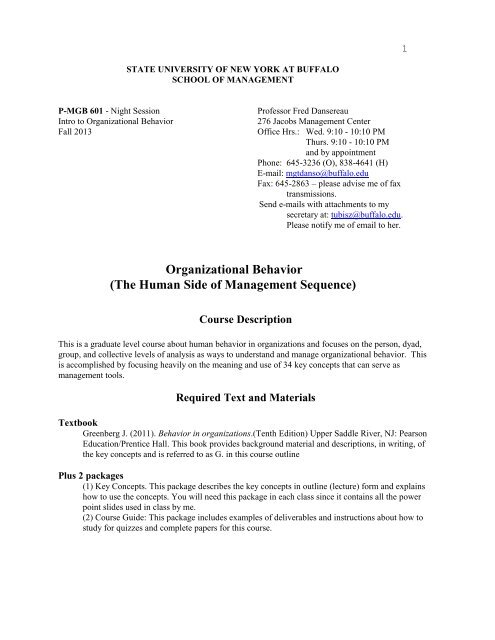
![Glossary of Action Verbs [PDF]](https://img.yumpu.com/50452890/1/190x245/glossary-of-action-verbs-pdf.jpg?quality=85)
![Download Brochure [PDF] - University at Buffalo School of ...](https://img.yumpu.com/46723301/1/184x260/download-brochure-pdf-university-at-buffalo-school-of-.jpg?quality=85)

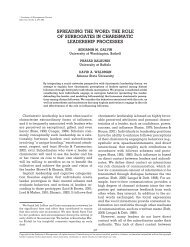
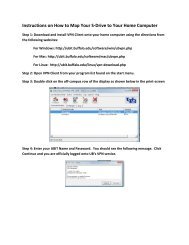
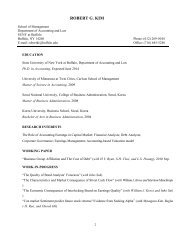

![CRC Newsletter [PDF] - University at Buffalo School of Management](https://img.yumpu.com/34736697/1/190x245/crc-newsletter-pdf-university-at-buffalo-school-of-management.jpg?quality=85)

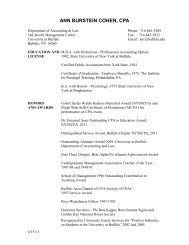
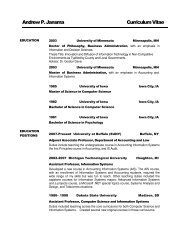
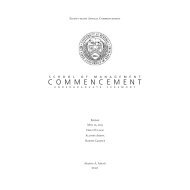
![Program [PDF] - University at Buffalo School of Management](https://img.yumpu.com/24102928/1/190x190/program-pdf-university-at-buffalo-school-of-management.jpg?quality=85)
